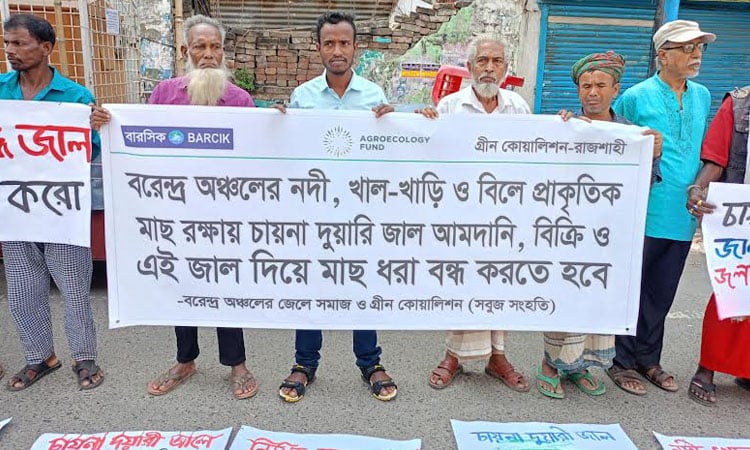News Flash
News Flash

RAJSHAHI, Oct 26, 2025 (BSS) - Social watchdogs and fishermen at a street-corner meeting here today called for strong resistance against the use of China fishing traps to protect aquatic resources, particularly fish species, in the region from further degradation.
They observed that these fishing traps have posed a serious threat to the breeding of native fish, especially small indigenous species, and have also adversely affected the livelihoods of marginalized fishermen.
The Green Coalition and Bangladesh Resource Centre for Indigenous Knowledge (BARCIK), a research-based development organization, jointly organized the meeting at Shaheb Bazar Zero Point in the city.
Green Coalition Convener Mahbub Siddiqui, Convener of July 36 Parishad Mahmud Jamal Kadery, Director of Samajik Kolyan Sangstha Samrat Raihan, President of Youth Action for Social Change Atiqur Rahman, President of Adibashi Juba Parishad Upen Rabidas, and fishermen leaders Jahangir Alam, Afaz Uddin Kabiraj, Raghunath Halder, and Abu Sama spoke at the meeting.
Presenting a concept paper, BARCIK Regional Coordinator Shahidul Islam said the ultra-fine mesh of China Duari nets catches everything in its path - including fish of all sizes, fish eggs, fry, and plankton - thereby destroying the breeding cycle of native species such as rui, katla, shing, and magur, and pushing them toward extinction.
He added that the improper use of such nets blocks the natural flow of water, leading to siltation and oxygen depletion (eutrophication) in wetlands. This suffocates aquatic life and destroys the natural habitats of native flora and fauna.
Mahbub Siddiqui said the commercial use of highly efficient but destructive China nets has marginalized traditional fishing communities in Rajshahi. The decline in fish populations means that traditional fishers using sustainable methods often return with little or no catch.
He also pointed out that the synthetic nylon fiber used in making these nets is non-biodegradable, contributing to severe plastic pollution in rivers and wetlands. Abandoned nets further add to environmental damage and increase the risk of entanglement for aquatic animals.
Siddiqui, however, noted that although China Duari nets are not specifically named as banned items, their ultra-fine mesh size makes them illegal under existing regulations such as the Bangladesh Fish Conservation and Protection Act, which prescribes a minimum mesh size for fishing nets.